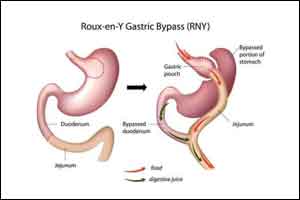- Home
- Editorial
- News
- Practice Guidelines
- Anesthesiology Guidelines
- Cancer Guidelines
- Cardiac Sciences Guidelines
- Critical Care Guidelines
- Dentistry Guidelines
- Dermatology Guidelines
- Diabetes and Endo Guidelines
- Diagnostics Guidelines
- ENT Guidelines
- Featured Practice Guidelines
- Gastroenterology Guidelines
- Geriatrics Guidelines
- Medicine Guidelines
- Nephrology Guidelines
- Neurosciences Guidelines
- Obs and Gynae Guidelines
- Ophthalmology Guidelines
- Orthopaedics Guidelines
- Paediatrics Guidelines
- Psychiatry Guidelines
- Pulmonology Guidelines
- Radiology Guidelines
- Surgery Guidelines
- Urology Guidelines
Bariatric surgery also lowers cancer risk in severely obese patients : Study

Severely obese patients who undergo bariatric surgery lower their risk of developing cancer by at least a third, according to a University of Cincinnati (UC) College of Medicine researcher leading a large retrospective cohort study of patients in the western United States.
"We found having bariatric surgery is associated with a reduced risk of cancer, especially obesity-associate cancers including postmenopausal breast cancer, endometrial cancer, pancreatic cancer and colon cancer," explains Daniel Schauer, MD, associate professor in the UC Division of General Internal Medicine and lead researcher. "What's surprising is how great the risk of cancer was reduced."
The findings were recently published online in the Annals of Surgery.
The study reviewed medical data of 22,198 individuals who had bariatric surgery and 66,427 nonsurgical patients between 2005 and 2012 with follow-up through 2014. It pulled data from large integrated health insurance and health care delivery systems from five study sites operated by Kaiser Permanente--Southern California, Northern California, Oregon, Colorado and Washington.
More than 80 percent of patients in the study were women.
Patients undergoing bariatric surgery had a 33 percent lower risk of developing any cancer during follow-up, according to the published findings. Schauer says the benefit is greatest among obesity-associated cancers. The risk of postmenopausal breast cancer dropped by 42 percent and while the risk for endometrial cancer dropped 50 percent in severely obese patients. The risk of colon cancer dropped 41 percent while the risk of pancreatic cancer was lowered by 54 percent.
"Cancer risks for postmenopausal breast cancer and endometrial cancer are closely related to estrogen levels," says Schauer. "Having weight loss surgery reduces estrogen level."
Bariatric surgery helps reduce the risk of diabetes and insulin levels which may be a risk factor for pancreatic cancer, while the mechanisms for colon cancer are more complicated, says Schauer.
"I think considering cancer risk is one small piece of the puzzle when considering bariatric surgery, but there are many factors to consider. Reductions in diabetes, hypertension and improvements in survival and quality of life are reason enough," says Schauer. "The study provides an additional reason to consider bariatric surgery."
The study found no significant association between bariatric surgery and cancer risk among men. Schauer says that may be because the vast majority of study patients are female and at least two of the cancers most impacted by bariatric surgery, postmenopausal breast cancer and endometrial cancer, affect women only.
Multivariable Cox proportional-hazards models were used to examine the incidence of cancer up to 10 years after bariatric surgery compared to the matched nonsurgical patients. After a mean follow-up of 3.5 years, researchers identified 2,543 incident cancers.
About 15 million adults in the United States suffer from severe obesity, which is defined as having a body mass index of greater than 35 kg/m2. Obesity and cancer are closely linked. Obesity is associated with up to 40 percent of all cancers diagnosed in the United States, says Schauer.

Disclaimer: This site is primarily intended for healthcare professionals. Any content/information on this website does not replace the advice of medical and/or health professionals and should not be construed as medical/diagnostic advice/endorsement or prescription. Use of this site is subject to our terms of use, privacy policy, advertisement policy. © 2020 Minerva Medical Treatment Pvt Ltd